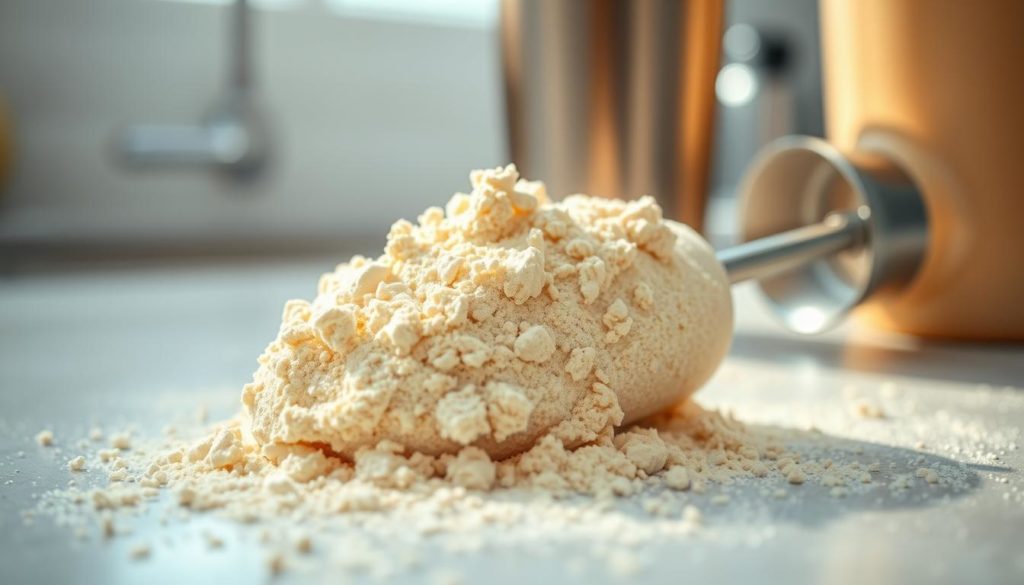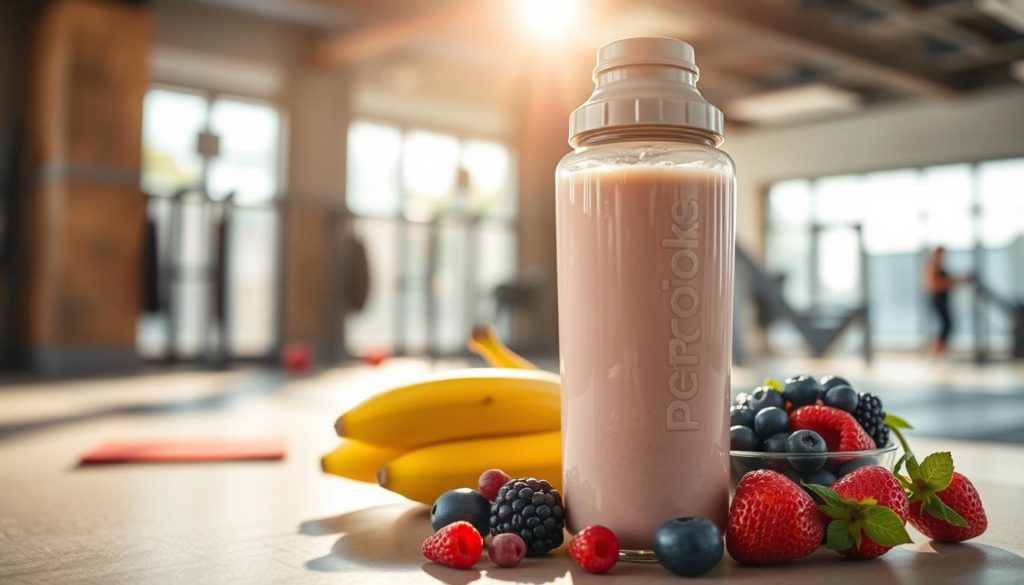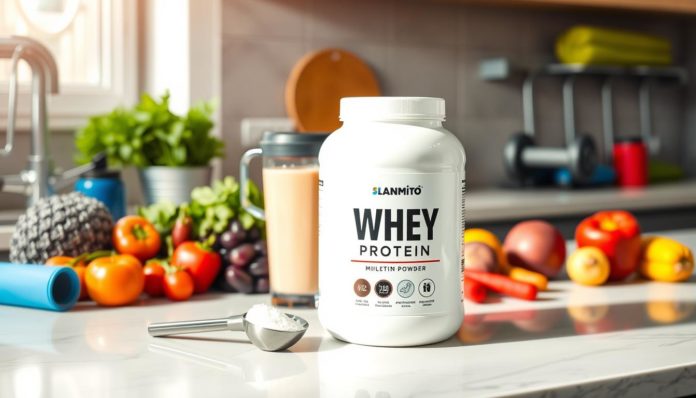Did you know about 70% of gym-goers take a protein supplement to boost their workouts? Whey protein is their top pick. It’s known for its muscle recovery benefits and fitness boost.
Whey protein benefits go beyond just building muscle. As a fitness supplement, it’s rich in essential amino acids. These help with muscle building and repair, making it crucial for your fitness goals.
If you’re an athlete or just starting out, knowing about whey protein is key. It can greatly improve your workouts and speed up muscle recovery.
What is Whey Protein?
Whey protein is a top-quality protein from cheese-making. It has all nine essential amino acids for muscle and health. It’s a favorite for fitness fans for better fitness and quick recovery.

Nutritional Composition
The nutritional value of whey stands out among protein supplements. Its nutrients include:
- Protein: High in quality and quantity, typically 20-27 grams per serving
- Carbohydrates: Minimal, around 1-5 grams, depending on the type
- Fats: Minimal, usually less than 2 grams per serving
This mix makes whey protein powder a key part of fitness plans.
Types of Whey Protein
Different whey proteins fit different needs. There are three main kinds:
| Type | Description | Protein Content | Common Uses |
|---|---|---|---|
| Concentrate | Contains some fats and carbohydrates; least processed | 70-80% | General protein supplementation |
| Isolate | More processed, removing most fats and carbs | 90% or more | Low-carb diets, lactose-sensitive individuals |
| Hydrolysate | Pre-digested, making it easier to absorb | Varies but typically high | Rapid digestion, post-workout recovery |
Knowing the types helps you pick the best protein supplements for your goals.
Benefits of Whey Protein
Whey protein is popular among fitness lovers. It boosts athletic performance and muscle gain. It also speeds up recovery and helps manage weight.
Muscle Gain
Whey protein is great for building muscle. It has essential amino acids, like leucine, which help muscles grow. Adding whey protein to your diet provides the building blocks your muscles need.
Recovery
Post-workout recovery is key for fitness fans. Whey protein, rich in BCAAs, helps muscles repair faster and reduces soreness. With whey protein after exercising, you recover quicker. This lets you work out more intensely next time.

Weight Management
Whey protein can also help you control your weight. It makes you feel full, which can lead to eating fewer calories. Plus, it helps maintain a lean body shape. For those looking at Whey Protein Weight Loss, whey protein is helpful. It’s a key part of achieving and keeping your body goals.
Best Whey Protein Powders in 2023
Looking for the right whey protein powder can feel tough because there are so many. We’ll explore the top brands of 2023 and what customers say about them.
Top Brands
Certain names stand out in the search for the best whey protein. These brands are loved for their quality and have earned people’s trust in 2023.
- Optimum Nutrition: Known for their Gold Standard Whey, which is praised for its blend of whey protein isolate, concentrate, and peptides, providing a balanced and effective protein supplement.
- MuscleTech: Offering products like NitroTech, which combines whey protein isolate with creatine to enhance muscle growth and recovery.
- Dymatize: Featuring ISO 100, a well-liked hydrolyzed whey protein with fast absorption and minimal lactose content.
- BSN: Their Syntha-6 delivers a sustained release of protein, making it suitable for both post-workout recovery and as a meal replacement.
- Isopure: Famous for its Zero Carb and Low Carb whey protein options, catering to those on keto diets or needing a carbohydrate-free supplement.
Customer Reviews
Customer opinions are super important for figuring out if whey protein powders are good or not. Let’s check out some reviews from happy users.
| Brand | Product | Customer Rating | Features | Customer Feedback |
|---|---|---|---|---|
| Optimum Nutrition | Gold Standard Whey | 4.8/5 | High Protein Blend, Affordable | “Excellent taste and mixes easily!” |
| MuscleTech | NitroTech | 4.6/5 | Contains Creatine, Fast Absorption | “Noticed significant muscle gain.” |
| Dymatize | ISO 100 | 4.7/5 | Hydrolyzed, Low Lactose | “Perfect for lactose-intolerant folks.” |
| BSN | Syntha-6 | 4.5/5 | Sustained Release, Great for Meals | “Keeps me full longer.” |
| Isopure | Zero Carb | 4.7/5 | Carbohydrate-Free, Keto Friendly | “Perfect complement to my keto diet.” |
These reviews show the top picks for whey protein, focusing on things like taste, how well they mix, and their benefits. Keep these points in mind to find the whey protein that meets your needs.
How to Choose the Right Whey Protein
Choosing the right whey protein can seem tough with so many choices out there. Think about your fitness goals, any food restrictions you have, your budget, and what tastes good to you.
- Understand Your Fitness Goals: What’s your target: muscle gain or staying fit? For muscle building, whey protein isolate is great. It has more protein and your body takes it in faster.
- Consider Dietary Restrictions: Pick a protein that fits your diet. If lactose is a problem, whey protein isolate has less lactose. This makes it a smart pick.
- Examine the Ingredients: Look closely at the label for extra stuff like artificial sweeteners or fillers. Choose products with the least additives to get a purer protein.
- Budget-Friendly Choices: Money matters too. Isolates cost more but are better quality. Find a good option within your budget without losing too much quality.
- Flavor Preferences: Don’t forget about taste. There are many flavors of whey protein, so choose one you like. This will help you stick with it.
Here’s a quick comparison of whey protein types to help you choose:
| Type | Protein Content | Lactose Content | Best For | Cost |
|---|---|---|---|---|
| Whey Protein Concentrate | 70-80% | Higher | General Fitness | $$ |
| Whey Protein Isolate | 90%+ | Lower | Muscle Building | $$$$ |
Keep these points in mind and you’ll find a whey protein that fits your lifestyle and fitness goals well.
Whey Protein Isolate vs. Whey Protein Concentrate
Choosing between whey protein isolate and concentrate means comparing benefits and costs. Each type suits different health and fitness goals.
Comparative Benefits
Whey protein isolate benefits include a high protein content of 90% or more. It’s great for those wanting lots of protein without the carbs and fats. Whey concentrate has about 70-80% protein. It’s good for those who don’t need too much protein.
Whey protein isolate has less lactose, so it’s easier to digest for some people. Whey concentrate has more lactose. It might not work well for those with digestion issues.
Cost Considerations
Cost is key when choosing your protein. Whey concentrate is cheaper, thanks to simpler processing. For many, protein powder cost is crucial in picking quality yet affordable options.
Whey protein isolate costs more but offers more protein and purity. For athletes or fitness buffs, the higher price can be a good investment for better muscle recovery and growth.
| Feature | Whey Protein Isolate | Whey Protein Concentrate |
|---|---|---|
| Protein Content | 90% or more | 70-80% |
| Lactose Level | Low | Higher |
| Cost | Higher | Lower |
| Best For | Max protein, low lactose | Balanced nutrition, cost-effective |
Incorporating Whey Protein Into Your Diet
Adding whey protein to your meals is easy and tasty. You can make a whey protein shake or try it in different meals. This helps boost your nutrition in a smooth way.
Whey Protein Shake Recipes
Making a whey protein shake is quick for a protein lift. Here are some yummy shake ideas.
- Chocolate Peanut Butter Shake: Mix one scoop of chocolate whey protein, one tablespoon of peanut butter, a banana, and a cup of almond milk.
- Berry Blast Shake: Blend one scoop of vanilla whey protein with blueberries and strawberries, half a cup of Greek yogurt, and a cup of water.
- Green Smoothie: Combine one scoop of unflavored whey protein with spinach, an avocado, a kiwi, and a cup of coconut water.
Meal Replacement Ideas
Whey protein can save time and balance your nutrient intake as a meal substitute. Here are easy ideas for daily meals.
- Protein-Packed Oats: Add a scoop of vanilla whey protein to morning oats and berries. It’s a strong start for your day.
- Protein Pancakes: Mix a scoop of whey protein with oat flour, a banana, and an egg. Fry it up for a nutritious breakfast.
- Protein Smoothie Bowl: Blend a scoop of whey protein with a frozen banana, berries, and a bit of almond milk. Add granola and chia seeds on top for a filling meal.
With these protein-packed recipes and meal ideas, enjoying whey protein is delicious and nutritious. Be creative and explore how whey protein can boost your diet.
Whey Protein for Muscle Gain
Whey protein is key for building muscle. Learn to use it with your workouts to get bigger muscles and recover faster.
Pre-Workout Uses
Taking whey protein before working out gives your muscles important amino acids. Drinking Pre-Workout Protein roughly 30 minutes before exercise boosts performance and endurance. This is great for tough workouts.
Post-Workout Uses
Post-Workout Recovery needs whey protein. After working out, your muscles need nutrients to repair and grow. A whey protein shake right after exercising helps you recover quicker and build muscle more efficiently.
Daily Intake Recommendations
It’s vital to hit your Daily Protein Intake for muscle building and health. Generally, consume 0.8 to 1 gram of protein per pound of your body weight. If you train hard, you might need more protein.
| Activity Level | Protein Needs (g/lb) |
|---|---|
| Sedentary | 0.8 |
| Moderate | 1.0 |
| Intense Training | 1.2 – 1.5 |
Use whey protein before and after workouts, along with meeting daily needs, to really boost your muscle gains.
Common Myths About Whey Protein
Many people believe things about whey protein that aren’t true. This leads to confusion and worry about using it. One big myth is that whey protein can hurt your kidneys. This is not true. Research, including studies by the Mayo Clinic, shows whey protein is safe for healthy people if they don’t have too much.
Another myth is that only bodybuilders can use whey protein. But, it’s good for many people, like athletes or anyone wanting to get more protein. Whey protein helps with muscle repair, boosts energy, and improves overall health for many types of people.
| Myth | Reality |
|---|---|
| Whey protein causes kidney damage. | Safe for healthy individuals when used appropriately. |
| It’s only for bodybuilders. | Beneficial for a wide range of people, including non-athletes. |
| Whey protein supplements aren’t necessary if you eat meat. | Convenient and effective way to increase protein intake. |
| Whey protein is unnatural. | Derived from natural dairy products. |
| Whey protein leads to excessive weight gain. | Supports muscle growth and can aid in weight management when used correctly. |
Knowing the real facts helps people make better choices about whey protein. Always talk to a doctor before you change your diet or exercise plan. They can help you decide what’s best for you.
Potential Side Effects of Whey Protein
Whey protein is a favorite among people who work out. But, it’s important to know its side effects. Some folks might feel bloating, gas, or cramps. This is especially true for those who can’t handle lactose well. Whey protein comes from milk. Choosing whey protein isolate helps, as it has less lactose than whey concentrate. Check out Whey Protein Side Effects for more details.
Allergies could also be a problem. Milk allergies aren’t as common as lactose problems, but whey protein can cause them. If you’re allergic to dairy, it’s best to stay away from whey protein. This helps avoid serious reactions like hives or anaphylaxis. For those worried about Protein Supplement Safety, trying plant-based proteins might be a good idea.
Too much whey protein isn’t just a problem for your stomach. It can make your kidneys work too hard. This is especially risky for people with kidney issues. Always stick to the recommended amount. This protects your kidneys and liver. When considering Protein Supplement Safety, talking to a doctor is smart, particularly if you have health problems.
FAQ
What are the benefits of using whey protein?
Whey protein helps with muscle gain, recovery, and weight control. It’s perfect for anyone looking to boost their fitness. It provides high-quality protein for muscle repair.
What are the different types of whey protein?
Whey protein comes in three types: concentrate, isolate, and hydrolysate. Concentrate is less pure but nutrient-rich. Isolate is purer, with less fat and carbs. Hydrolysate gets absorbed the fastest.
How should I choose the best whey protein powder?
Choose based on your needs, goals, budget, and taste. There’s a whey protein for everyone, whether you prioritize muscle building or value.
Can whey protein help with weight management?
Yes, whey protein helps manage weight by keeping you full longer. It promotes a lean body and fits into a weight-loss diet well.
What are some good whey protein shake recipes?
For a tasty shake, blend whey protein with a banana, almond milk, and cinnamon. Feel free to experiment with other ingredients like fruits and nuts.
Is whey protein safe to use daily?
Whey protein is generally safe every day for most people. Still, follow dosage advice and check for intolerances. When in doubt, talk to a healthcare pro.
What are some common myths about whey protein?
Some think whey protein harms kidneys or is only for bodybuilders. But research confirms it’s safe and useful for many, not just athletes.
Are there any potential side effects of whey protein?
Potential issues include digestive problems or allergies. If lactose intolerant, choose whey isolate with less lactose. Begin with small amounts to test tolerance.
How does whey protein aid in post-workout recovery?
Whey protein supports muscle repair and growth after exercise. Its fast absorption helps quickly deliver nutrients vital for recovery.
What makes whey protein isolate different from whey protein concentrate?
Isolate removes fats and carbs for higher protein. Concentrate has more original nutrients. Isolate suits those with lactose issues, while concentrate is easier on the wallet.


